|
|
|
Sort Order |
|
|
|
Items / Page
|
|
|
|
|
|
|
| Srl | Item |
| 1 |
ID:
190133


|
|
|
|
|
| Summary/Abstract |
Japan’s longest serving prime minister, Abe Shinzo was struck and killed by a bullet at 67 years of age on July 8, 2022. Several breakthrough policies, strategies, and principles in the fields of security and diplomacy were included in legislation enacted during his term as prime minister. This article discusses the background and effects of selected achievements of former Prime Minister Abe Shinzo, one of the postwar era’s most influential politicians who should be remembered for pushing Japan’s security and diplomacy policies beyond their traditional boundaries.
|
|
|
|
|
|
|
|
|
|
|
|
|
|
|
|
| 2 |
ID:
178218
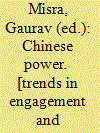

|
|
|
|
|
| Publication |
New Delhi, KW Publishers Pvt Ltd, 2021.
|
| Description |
xii, 243p.hbk
|
| Standard Number |
9789389137972
|
|
|
|
|
|
|
|
|
|
|
|
Copies: C:2/I:0,R:0,Q:0
Circulation
| Accession# | Call# | Current Location | Status | Policy | Location |
| 059999 | 327.51/MIS 059999 | Main | On Shelf | General | |
| 060000 | 327.51/MIS 060000 | Main | On Shelf | General | |
|
|
|
|
| 3 |
ID:
171152
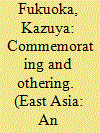

|
|
|
|
|
| Summary/Abstract |
The Yasukuni Shrine in Tokyo, once the symbolic center of national commemoration of war dead in pre-War years, is now regarded as one of the critical conservative symbols of Japan’s imperial past. While the Yasukuni study is expanding, not much has been explored on the nature of public reactions to the controversy. This study explores Prime Minister Abe Shinzo’s Yasukuni pilgrimage in 2013 and delves into Japanese public opinion on and around it. Overall, the Japanese public is relatively composed and prefers cautious approach; yet, at the same time, more people now support the official Yasukuni visits in general. This study also reveals discernible, yet nuanced, disagreements among PM Abe’s Yasukuni policies, the public perceptions of them, and the narratives of major newspaper editorials on this issue. The coverage of public opinion polls by the major national newspapers uncovers the public opinion on (1) the official Yasukuni visit, (2) the idea of building an alternative non-religious national memorial, and (3) the Japanese public’s decreasing sense of affinity toward China and South Korea (and their implications on understanding the Yasukuni issue and the sense of nation). The study will also examine the newspaper narratives on the controversy, which should help exemplify the overall public mood over the years.
|
|
|
|
|
|
|
|
|
|
|
|
|
|
|
|
| 4 |
ID:
177075


|
|
|
|
|
| Summary/Abstract |
Prime Minister Abe Shinzo changed Japan’s place in international society. Now Japan matters in the world thanks to him. Many of the domestic structural reforms he pledged, however, are left to his successor. New Prime Minister Mr. Suga Yoshihide is now jump starting the process to put forth his own policy agendas. As he was Chief Cabinet Secretary for over seven years, he already has a strong grip on the whole government. Where he is leading Japan is now closely watched by the world.
|
|
|
|
|
|
|
|
|
|
|
|
|
|
|
|
| 5 |
ID:
130192
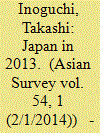

|
|
|
|
|
| Publication |
2014.
|
| Summary/Abstract |
This article describes the ups and downs and complexities of Japanese PrimeMinister Abe Shinzo's ''Abenomics'' and ''Abegeopolitics,'' political approaches designed to revitalize Japan's economy and restore its national pride and strength, respectively.
|
|
|
|
|
|
|
|
|
|
|
|
|
|
|
|
| 6 |
ID:
186360


|
|
|
|
|
| Summary/Abstract |
As the longest-serving Prime Minister so far, Abe Shinzo will be remembered for the unprecedented shifts he brought about in Japan’s security policies, which will most likely have a lasting impact. From creating new institutions to fundamental changes in decision-making and from constructing a new framework for defense strategy and acquisition of offensive military capabilities to deftly managing the alliance with the US, Abe has left an indelible mark. He also came up with the Indo-Pacific construct and the Quad, which have become the key facets of regional security. Abe’s initiatives are radical, but will they lead Japan to charter an equally new radical path?
|
|
|
|
|
|
|
|
|
|
|
|
|
|
|
|
| 7 |
ID:
187139


|
|
|
|
|
| Summary/Abstract |
The article explains how Japan's strategic interests are converging with India against an assertive China in the Indo-Pacific. Japan has been pursuing a “Free and Open Indo-Pacific” (FOIP) policy, which seeks to manage China's rise by deepening Japan's strategic coordination and cooperation with its closest partners through the Quad. Though Japan still values its bilateral relationship with the United States (US), its security partnership with India is part of Tokyo's persistent efforts to support the US-led rules-based international order. In order to counter China's Belt and Road Initiative (BRI) in the Indo-Pacific region, Japan has been a strong supporter among the Quad to promote non-military cooperation, primarily focusing on infrastructure building, supply chain resilience and technological innovations. The article argues that Japan's strategic engagement with India is now an integral part of its wider national security posture as Tokyo has come to recognise New Delhi as an important balancer against Beijing. That the US has enhanced its ties with India in recent years has further facilitated Japan–India strategic convergence since it is aligned with American policy towards the Indo-Pacific region in an era of great power competition.
|
|
|
|
|
|
|
|
|
|
|
|
|
|
|
|
| 8 |
ID:
124592


|
|
|
|
|
| Publication |
2013.
|
| Summary/Abstract |
Large antinuclear demonstrations in 2012 and significant expansion of renewable energy have sparked a degree of euphoria about the prospects for phasing out nuclear energy in Japan. But Prime Minister Abe Shinzo is pronuclear and favors restarting Japan's idled reactors. His Liberal Democratic Party now controls both houses of the Diet and is a key pillar of Japan's nuclear village, comprising influential government, business, and political institutions that advocate nuclear energy. The nuclear village retains veto power over national energy policy, and citizens will not get to decide the outcome even if public opinion polls indicate that a vast majority favor phasing out nuclear energy. By ignoring many of the lessons of Fukushima and fast-tracking reactor restarts, the government and utilities continue to downplay risk, leaving Japan vulnerable to another nuclear accident.
|
|
|
|
|
|
|
|
|
|
|
|
|
|
|
|
| 9 |
ID:
152075
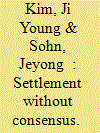

|
|
|
|
|
| Summary/Abstract |
What has shaped contemporary discourse on Japan’s comfort women issue? During the last twenty-five years, civic groups in both Japan and South Korea have made significant efforts to publicize the issue within the international community, hoping to narrow the disparity between the position of the international community and that of the Japanese government. Thus far, however, Japan’s official position has shown little change. Why has international pressure on Japan failed? By focusing on the relationship between international pressure and the formation of Japan’s discourse on the comfort women issue, this paper shows how outside pressure led to a domestic backlash among conservatives in Japan, resulting in the failure to institutionalize apologetic discourse within Japanese society. This study will provide important insights on how democratic countries can sometimes resist strong external pressure to conform to international norms.
|
|
|
|
|
|
|
|
|
|
|
|
|
|
|
|
| 10 |
ID:
175664
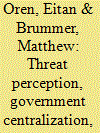

|
|
|
|
|
| Summary/Abstract |
In this paper, we review the International Relations literature and derive from it certain expectations of how government centralization may affect threat assessment, and from these, generate formal hypotheses. We then test these against the evidence of the extensive structural changes within Japan’s national security apparatus and the government’s threat perception in the period spanning the first and second Abe administrations (2006–2018). Drawing from official government documents, we find marked change to certain metrics of Japan’s threat assessment beginning in 2013, the first full year of the second (and current) Abe Administration. We argue that political instrumentality, and in particular, Abe’s policy agenda of breaking the constitutional status quo and resolving the territorial dispute with Russia, were paramount in shaping official threat assessment during this period (2012–2018). Our findings lend evidence to both the scholarships on threat perception and government centralization, as well as to the debate of Abe’s legacy in Japan’s post-war security policy.
|
|
|
|
|
|
|
|
|
|
|
|
|
|
|
|
|
|
|
|
|